Field Note #11: Bullies and Heroes
- The Wolfess

- Sep 3, 2020
- 7 min read
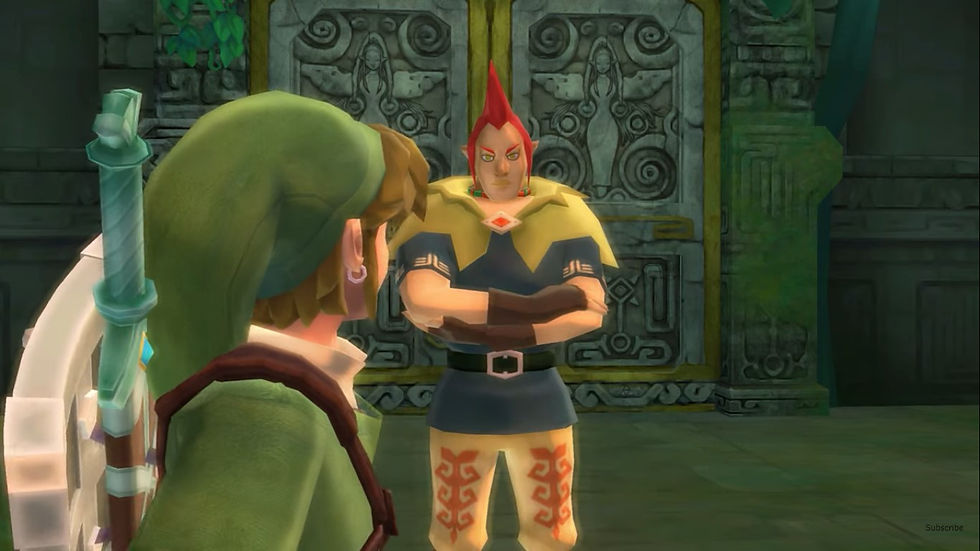
Base Stats:
Game: Skyward Sword
Version: Original Wii Version, Physical Copy
System: Nintendo Wii U
Session Play Time: 1 hr 53 min
Total Play Time: 18 hrs 50 mins
Content Covered: Isle of Songs #1, Goddess Trial #1, Dive to Lake Floria, Water Dragon’s lair entrance
Fi Report: 4 Forced Interruptions
When you think about our favorite hero in green, what do you picture? A warrior fearlessly charging into battle against insurmountable odds? A goofy boy who likes to sleep in and smash pots? A silent yet social people person who has to talk to literally everyone in every town he ever visits? A meek, submissive young man who suffers under the constant torment of a bully and his lackies…wait, not that last one? That’s not what you picture when you think of Link?
At the beginning of Skyward Sword, we come to learn that Skyward Sword Link endures constant torment at the hands of Groose, the big bully of the Knight Academy, and his lackeys. Groose is taller than the other boys, stronger than the other boys, clearly very athletic, and has that strange charisma that causes some people to naturally excel. He’s a regular jock, to use school stereotypes. I saw a comic once comparing Groose to Gaston from Disney’s Beauty and the Beast and have never quite shirked the comparison. It’s just too perfect.

In the very first field note, we touched base on this passive attitude that Sky Link has at the beginning of the game. He takes responsibility for nothing and lets others steer his life FOR him. At the same time, he is lazy and has everything come so naturally to him that it frustrates some people in his social circle—including Groose. Some might say that despite Groose’s own personal success, his urge to bully Link is driven by jealously of all the gifts that have been handed to the hero-to-be on a silver platter while Groose (presumably) feels like has had to work for what he has.
But that was almost nineteen gameplay hours ago—many in-game days have passed since those lazy days in the sky where Link’s biggest worry was what nefarious schemes Groose and his cronies were up to that day. Link has faced real challenges and mortal danger. He has failed and been forced to take responsibility for his actions. He has dug deeper inside himself than he ever had to before. After all, the fate of the world and of his best friend are resting solely on his shoulders. No matter how heavy the burden, Sky has learned how to stand tall under the weight.
We find our hero coming off a shocking encounter at the ancient Temple of Time where he arrived just in time to protect Impa and Zelda from the evil Ghirahim, giving them a few precious extra moments to escape beyond the Demon Lord’s grasp. Link is following Impa’s final advice and heading back to the Sealed Temple to speak with the old lady. As he jumps off of his loftwing and drifts down through the clouds to the surface, as he has done many times before at this point, we suddenly hear a terrified screaming overhead.

Out of nowhere, Groose catapults down toward Link, his mouth open in a terrified yet determined scream, his hands outstretched in panic toward the smaller man. Link’s eyes widen and he screams as well as Groose catches Link’s tunic and holds on. Link pulls out his sailcloth to slow their rapid descent, but the two men crash into the earth of Faron Woods. The Groosenator has arrived on the surface.
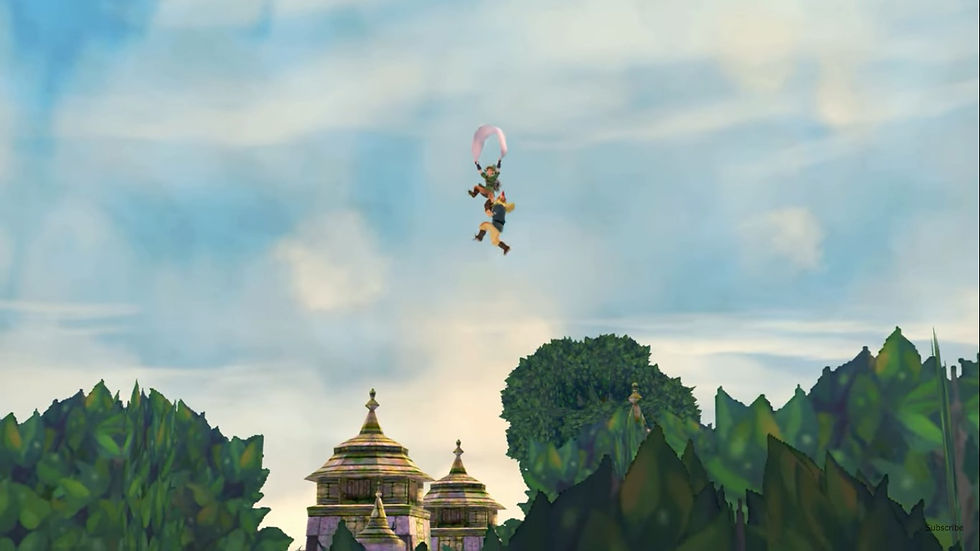
In a cutscene that is as amusing as it is interesting, we learn that Groose got fed up with moping around his room watching Link come and go from Skyloft. If a moment of grief-stricken brilliance (or stupidity, depending on who you ask), he decided to tail Link the next time he left Skyloft. Groose momentarily freaks out about being on the ground and grabs Link by the shoulders, shaking him back and froth so hard that the hero’s head flops around. Rather than get angry and shove Groose away, our hero just smiles, pats Groose’s arm, and explains everything.
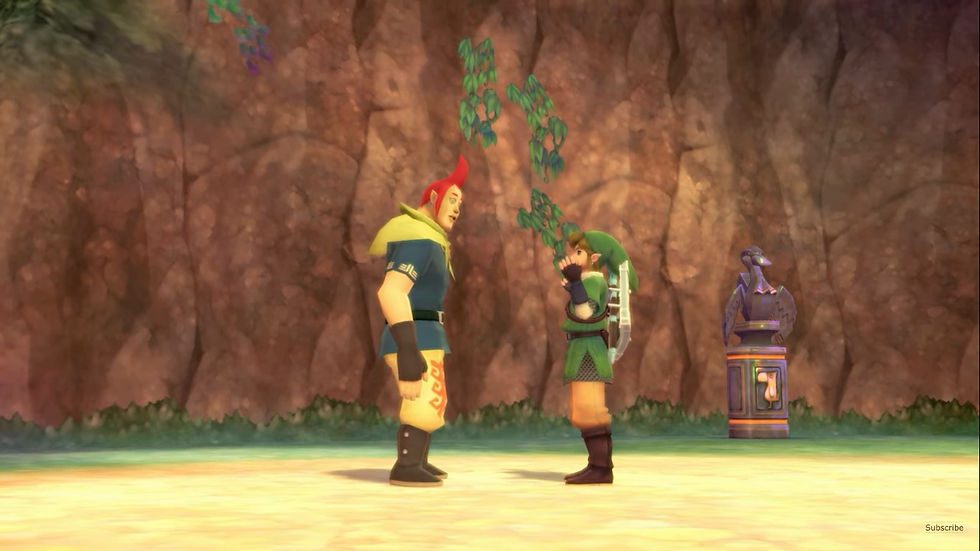
After Link’s explanation, Groose starts to calm down and you can tell that the wheels inside his head are turning. Up until this moment, we started to glimpse another side of Groose—a side of him that is sensitive and worried and scared by everything happening—but that window into his true nature shuts down as abruptly as it appeared. He straightens his pompadour, scoffs, and tells Link that he can go home now. “Big Groose will handle the search for Zelda from here.”

This is such an important moment for Link. Groose gives Link a perfect out, and I think that the old Link would have debated a bit but, ultimately, may have taken it. He may have recognized that the decision was made, shrugged, and walked away. It might not have sat well with him, but he would assume that Groose would take care of it now. After all, other people had always done the work for him in the past and he was perfectly content to let them do it. Without Zelda there to push him anymore, he might have just let it all go.
But this isn’t the old Link. No, this Link follows Groose into the Sealed Temple. He marches right up to where the large bully is yelling at the old woman and interrupts. Up in Skyloft, the old Link stood there and took Groose’s verbal abuse and didn’t do anything to defend himself. Zelda had to stand up on his behalf. But that Link is nowhere to be found. He’s gone forever.

What strikes me about Link in this moment is that he doesn’t yell back at Groose or defend himself in any way, verbally or physically, and yet he still radiates a sense of personal power. He has drive and purpose, now, as well as a new sense of self-confidence. He knows that he can overcome anything sent his way. He has proven himself time and time again. Most of all, he knows without a shadow of a doubt that no one can save Zelda but himself. It had to be him, and Groose would have to figure it out. Link has nothing to prove anymore.
In this scene, and in the fight with the Imprisoned afterward, Link barely pays attention to Groose. He goes about his duty fighting evil and getting his next directions from the old lady without directly confronting his age-old bully at all. There’s no fight in the schoolyard where Link finally puts Groose in his place. There’s no dramatic argument where Link tells Groose that he doesn’t matter anymore. After the battle with the Imprisoned, Link and the old lady talk and then walk away as if you can’t see Groose standing in the background trying to say something the whole time. He might as well be invisible and mute for all they pay attention to him. Link, quite simply, doesn’t have time to worry about his small-potatoes old bully. It brings to mind that old saying that says “the opposite of love isn’t hate, it’s indifference”.
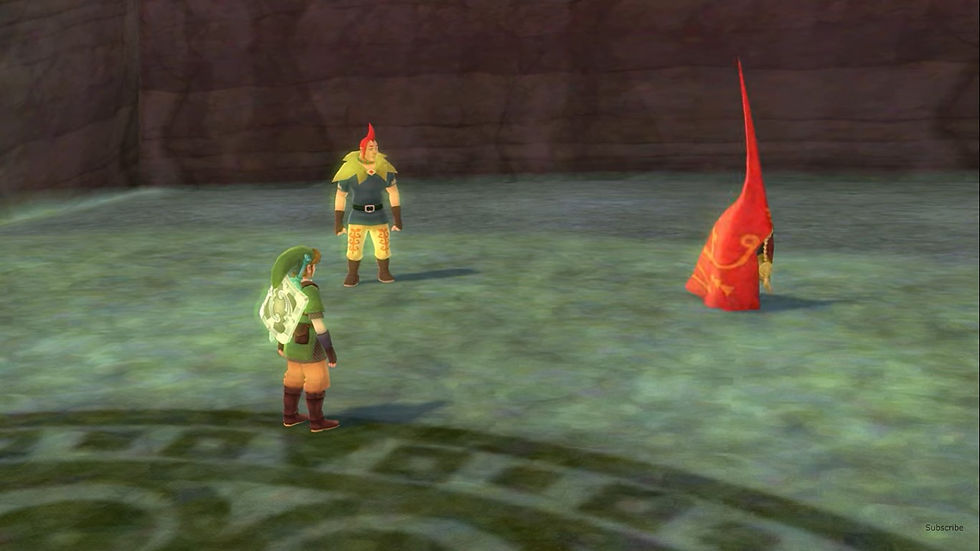
That indifference from both Link and the powers-at-be themselves, more than anything else, seems to be what finally gets under Groose’s skin. We see the tough-guy exterior crumble away, and Groose’s hot air balloon of fake confidence collapses. He tells Link and the old woman that he finally understands. “Me, well, there’s nothin I can do to help Zelda. I’m useless.” And he runs away to cry by himself outside. This is the beginning of a well-written redemption arc that warms up many of our hearts toward Groose by the end of the story. We will eventually touch on that, but for now I want to take a moment to slow down here and comment on the turn this bully narrative has taken.

Bully stories are very, very common in all forms of media. It’s an old faithful of an archetype: small kid gets bullied by big jerk until one day he finally stands up for himself and is never bullied again. Many of us who have had bullies in the past may have even spent time fanaticizing about showing up our own bullies one day. But the truth of life is that we often don’t get an opportunity to play out that fantasy. It’s a good story and a happy thought to get us through the hard days, but it very rarely happens.
What is more common is simply that we grow up and go different ways from our bullies. We learn who we are and grow as people. We learn a sense of self-confidence. Perhaps we even find some success in our lives and build a supportive network around us who encourage us. Then, when we see our bully again in the future, they don’t seem to be a threat anymore. They’re not important in our story, and they have no power over us now. Although sometimes we may feel like we have the power to get them back for everything they did to us, more often than not we simply move on with our lives. We have more important things to do.
Despite the old archetype, this is truly the better path. The fact is that we will run into many types of bullies throughout our lives. Childhood bullies give way to bully bosses or bully coworkers. Getting it over on one person will never solve all our problems, and the more we hate the people who hurt us, the more power they hold over our lives. Hating people puts power over us directly in their hands.

To let go of hate is to truly heal. You and I, we have survived the bullies of our past and become better people. Stronger people. The personal power we carry inside can’t ever be taken away, and we don’t need to prove it to anyone. Who knows? Perhaps one day you will find out that your old bully had their own issues that they were trying to mask. We are all going through a journey and deal with our inner demons differently. That doesn’t make what they did okay, but their actions don’t justify our revenge either.
I truly believe that returning hate for hate will never be a good solution to any problem. In this scene, Link shows us that a true hero doesn’t need to prove his strength to anyone but himself. Believe in yourself. Believe in the life you have built and the person you have become. You have an inner power that no one can touch and it will shine through in the actions you take toward making the world a better place without victimizing others—not even the person who victimized you. It’s a hard path to walk, but going down that path of self-discovery, no matter how hard the obstacles in the way may be, is what inevitably makes us heroes.



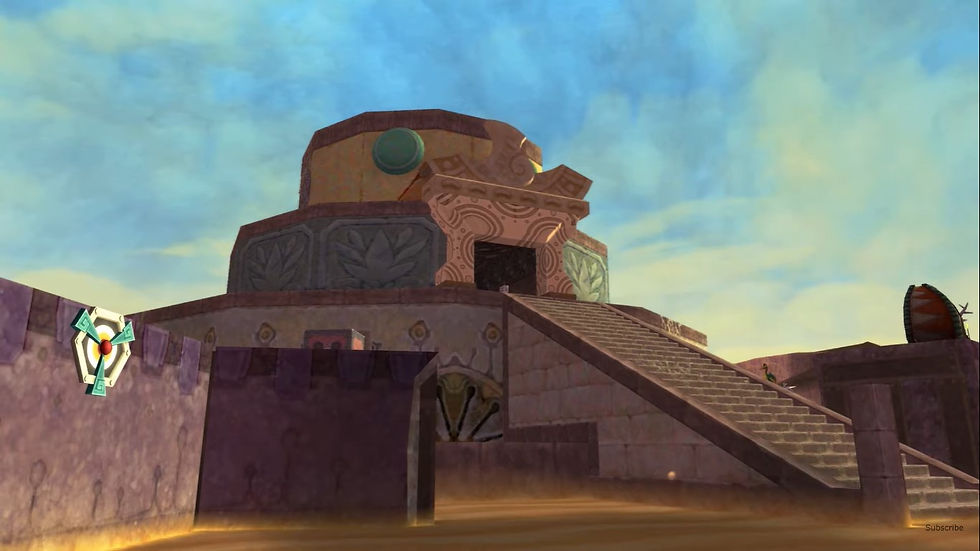
Comments